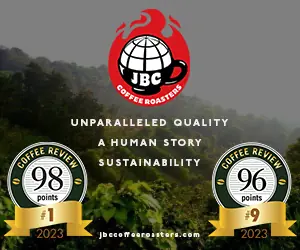Courtesy of Kenneth Davids, 21st Century Coffee: A Guide
Papua New Guinea (often abbreviated PNG) occupies the eastern half of the enormous, mountainous island of New Guinea, just north of Australia and east of the islands of Indonesia.
However, Papua New Guinea has almost nothing in common with Indonesia coffee origins like Sumatra or Java. The peoples are different, the landscapes are different and, more to the point in a book like this one, the coffees of Indonesia and Papua New Guinea are very different.
The verdant yet dauntingly rugged mountains of central Papua New Guinea offer one of the world’s most favorable terroirs for the production of fine Arabica coffees. These green-carpeted, soaring mountains and their lush, isolated valleys also impose some of the coffee world’s most intractable challenges with respect to transportation and infrastructure.
The Plantation vs. Tribal Dichotomy
The modern Papua New Guinea coffee industry was pioneered in the 1950s mainly by Australians, who introduced conventional ferment-and-wash processing methods that produce a cleaner, more familiar profile than produced by Indonesian wet-hulling. For many years PNG coffees were divided between plantation coffees produced by estates and wet mills located close to the central region’s only highway, and tribal or small-holder coffees produced by rougher, more primitive versions of conventional wet processing that were often carried out in more isolated parts of the mountains. The orthodox wet-processed plantation coffees came with grade designations like A and B, while the tribal coffees were bulked together and relegated to the opposite end of the alphabet, as grade Y.
Recent PNG Changes
Over the past 20 years or so the situation has grown more fluid and complex. Some small-producer coffees have improved owing to more careful harvesting and processing and are no longer bulked with others. Meanwhile some larger plantations either have dissolved into centralized mills buying both coffee fruit and parchment coffee from small holders or are owned by tribal associations or local individuals. It appears that only a relatively small percentage of Papua coffee is still produced by large estates with outside ownership, the principal one being the Australian-owned Carpenter Estates and its flagship Sigri Estate.
Papua New Guinea produces some splendid coffees. The best are usually processed using traditional wash-and-ferment methods in mills near the main highway that winds through the central mountains. Coffees that are wet processed by small producers on their tiny farms back in isolated valleys and later bulked together by exporters tend to be understandably inconsistent, though often endearing in their quirky, sweet-fermenty funkiness. Some of the better and more consistent of these village coffees may show up on specialty lists, particularly when certified organic or fair trade.
PNG Growing Regions
Most Papua New Guinea coffee production is concentrated in four highlands provinces clustered near the center of the country: Western Highlands, including the town of Mount Hagen and the Waghi Valley; Eastern Highlands, centered on the towns of Goroka and Kainantu; and between them, Jiwaka and Chimbu Provinces. Small-holder coffee is also produced elsewhere, including Morobe Province, farther east in the central mountain highlands.
The Papua New Guinea Cup
Top Specialty Lots from Centralized Mills (A and B Grades).
Bright but balanced, gently fruit- and floral-toned, sweet. Fruit may range from stone fruit through roundly ripe citrus to black currant. Usually there are chocolate notes, from raisiny dark chocolate through crisp roasted cacao nib. Flowers are typically backgrounded, but when they surface they almost always suggest lily or heavily scented dusk-blooming flowers. The most distinctive note in many high-end Papua New Guineas is a cleanly and sweetly pungent fruit note that I associate with pink grapefruit.
Bulked small-holder coffees (Y grade).
Usually rustic but can be charming, with mild but distinct fruit ferment and hints of musty earth complicating an attractive high-grown balance.
Papua New Guinea Coffee Ratings and Reviews
Click here for ratings and reviews of coffees from Papua New Guinea.










